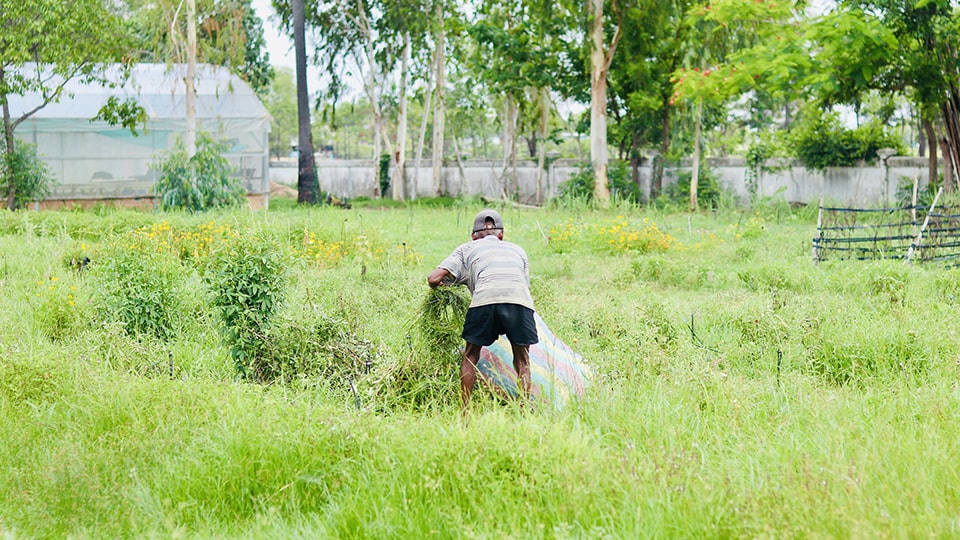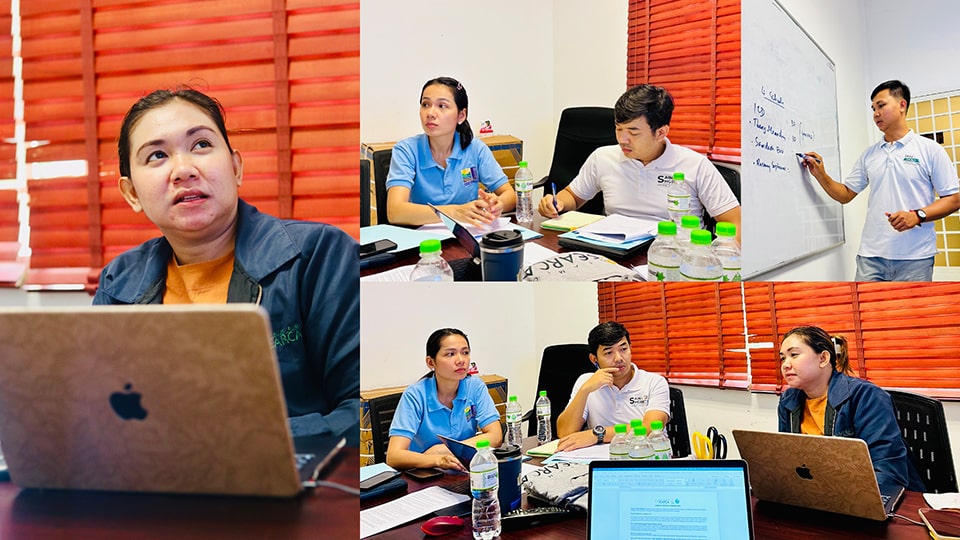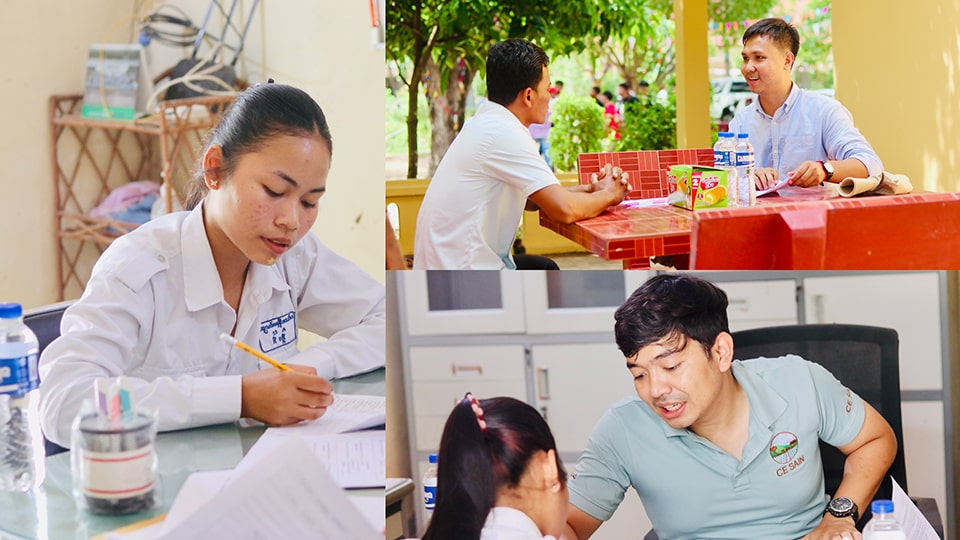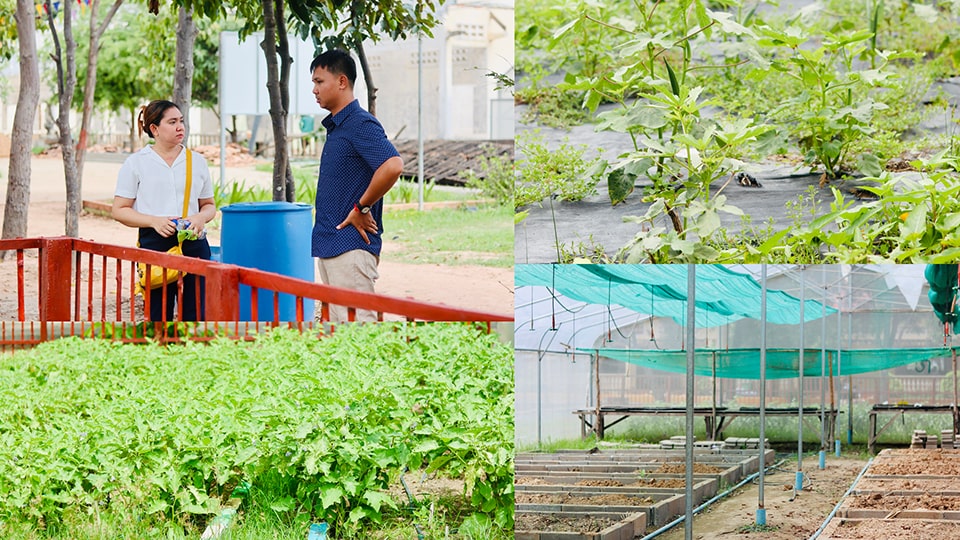 Maintenance staff tends a school garden during the monitoring and evaluation (M&E) of the school garden program at Raksmey Sophanna High School in Kampong Thom, Cambodia.
Maintenance staff tends a school garden during the monitoring and evaluation (M&E) of the school garden program at Raksmey Sophanna High School in Kampong Thom, Cambodia.
PHNOM PENH, Cambodia—The Southeast Asian Regional Center for Graduate Study and Research in Agriculture (SEARCA)and the Center of Excellence on Sustainable Agricultural Intensification and Nutrition (CE SAIN) convened a Baseline Assessment Workshop on 20–21 May 2025, at CE SAIN Hall, Royal University of Agriculture, Cambodia. This event kicked off a comprehensive baseline study under the School-plus-Home Gardens cum Biodiversity Enhancement and Enterprise Program to evaluate existing school gardens and assess students' knowledge, attitudes, and perceptions (KAP) on vegetable production and consumption as well as household consumption patterns, food security status, and coping strategies.
The primary objective of the workshop was to validate the research methodology, finalize the data collection instruments, and fine-tune the survey questionnaires for accuracy, clarity, and contextual relevance. Collaborative discussions and expert input at the workshop sought to enhance the methodological precision and appropriateness of the baseline data collection tools. The workshop also clearly defined the roles, responsibilities, and expectations of participants to be engaged in the baseline study and established data collection protocols and set detailed timelines to ensure efficient and high-quality data. The workshop fostered a shared understanding among project partners, researchers, and field personnel for a cohesive and well-structured implementation process.
 Ms. Anna Gale Vallez (left), SEARCA Program Specialist, and Dr. Leangsrun Chea (top right), CE SAIN Agricultural Technical Manager, discuss with enumerators during the Baseline Assessment Workshop.
Ms. Anna Gale Vallez (left), SEARCA Program Specialist, and Dr. Leangsrun Chea (top right), CE SAIN Agricultural Technical Manager, discuss with enumerators during the Baseline Assessment Workshop.
Furthermore, the workshop enabled participants to deepen their understanding of the research framework and the practical considerations for fieldwork. This collaborative environment helped ensure that baseline data collected are reliable, comprehensive, and actionable for subsequent policy recommendations and program interventions to improve agricultural sustainability and food security in Cambodia.
 Dr. Leangsrun Chea (top right) and Mr. Soten Chea (bottom right), both of CE SAIN, with students and a parent, conduct the pre-testing of questionnaires at Raksmey Sophanna High School in Kampong Thom, Cambodia.
Dr. Leangsrun Chea (top right) and Mr. Soten Chea (bottom right), both of CE SAIN, with students and a parent, conduct the pre-testing of questionnaires at Raksmey Sophanna High School in Kampong Thom, Cambodia.
Prior to the data collection, all survey instruments underwent rigorous pre-testing at Raksmey Sophanna High School in Kampong Thom Province, Cambodia. Feedback from key stakeholders involved in the administration of the questionnaires contributed to refinements of the implementation strategy for a more efficient and contextually appropriate administration of survey instruments.
 Ms. Anna Gale Vallez (left), SEARCA Program Specialist, led the monitoring and evaluation of the Mini-ATP at Raksmey Sophanna High School in Kampong Thom, Cambodia.
Ms. Anna Gale Vallez (left), SEARCA Program Specialist, led the monitoring and evaluation of the Mini-ATP at Raksmey Sophanna High School in Kampong Thom, Cambodia.
Monitoring and evaluation (M&E) was also conducted for the Mini-Agricultural Technological Park (ATP) to assess its implementation and ongoing performance. The evaluation tracked the diversity of vegetable crops cultivated within the school garden and assessed its management and maintenance practices to ensure that the Mini-ATP operated effectively as an educational and agricultural resource while identifying areas for improvement to enhance its sustainability, student learning outcomes, and community engagement.